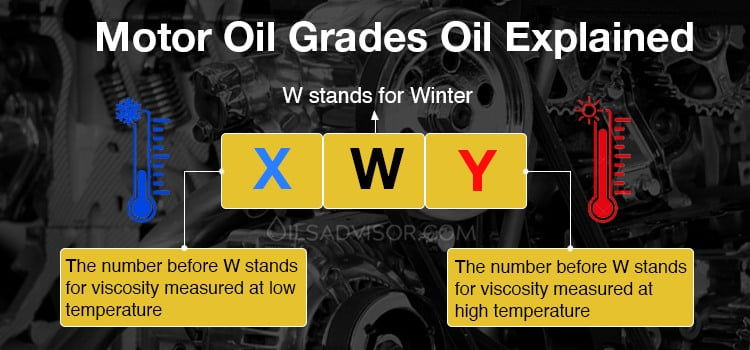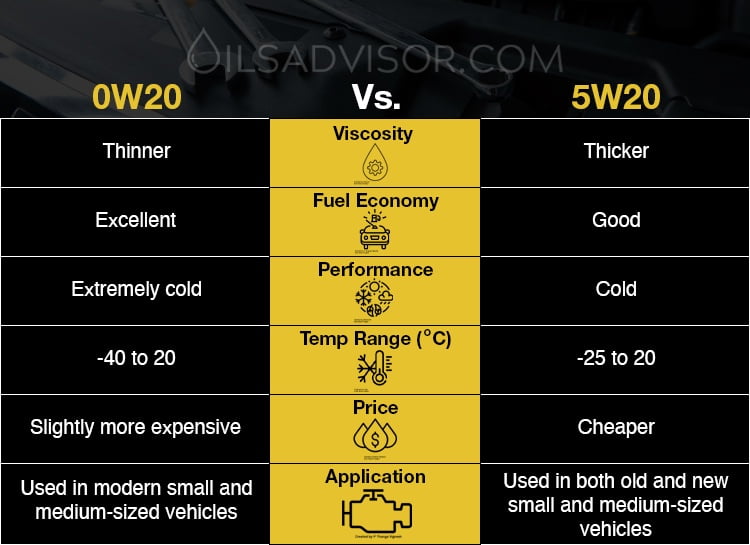Engine oil is the backbone for effective engine performance. It improves the performance of mechanical parts while also extending their lifespan. Therefore, choosing the proper oil is very essential.
However, engine oils are so diverse that they can make you confused in choosing the right one. Let’s take 0W20 and 5W20 for instance, these oils look similar, but they actually have clear-cut differences and are used in different weathers.
This article will unfold the differences between 0W20 vs 5W20 and the meaning of various codes mentioned in the engine oil bottle.
Let’s dive in!
Engines Oil Codes Explained
Viscosity: Thin & Thick
The resistance of a fluid to flow at a certain temperature is referred to as oil viscosity. Thin oils will pour more freely at low temperatures than thicker oils with a higher viscosity.
Thin oils are often winter-grade because they reduce engine friction and help engines start faster in low temperatures. At high temperatures and loads, thick oils, often known as summer-grade oils, sustain superior film strength and oil pressure, as well as seal better.
W, the Number Before and After W
To know the variations between 0W20 and 5W20, you must first understand what these numbers and letters represent.
The viscosity of motor oil is widely evaluated at different temperatures. When you pick a bottle of motor oil, you will see the xx-W-yy format. What does it mean? The letter “W” stands for Winter. The number before “W” stands for viscosity at low temperature. The lower the number, the thinner the oil will be and the easier it will flow around your engine. The number after “W” denotes the viscosity at high temperatures. The higher the number, the thicker the oil will be.

0W20 Vs 5W20: Key Things in Common
Multi-Grade Oil
There are 2 types of viscosity grade: Single grade and multigrade oil. Single oils like SAE 30, SAE 20,.. are known as straight-weight oils since they can’t utilize viscosity modifiers. They only meet the high temp requirements of the SAE classification systems.
0W20 and 5W20 are multi-grade motor oils. They contain unique polymers that enable them to perform in a wide range of temperatures. When cold, this oil type does have the viscosity of the base grade, and when hot, it has the viscosity of the second grade. An SAE 5W20 oil, for example, would be a lubricant that works like an SAE 5 at cold temperatures (5W for winter) and SAE 20 at 100 °C (212 °F).
The “W20”
As you can see, in 0W20 and 5W20, there is “20” after “W”. The “20” in the W20 grade refers to how oil flows through an engine at greater temperatures, such as when it reaches typical operating temperatures. Consider how your oil flows after your engine has warmed up and you’re traveling down the interstate.
Related: 5w20 Vs 5w30: Head to Head Comparison
0W20 Vs 5W20: Head-To-Head Comparison

Key Features/Specifications
In low temperatures, the 0w20 has a thickness grade of 0, indicating that it is exceedingly thin. The thickness grade of the 5w20 is 5, which is low but not as light as the 0w20’s. In freezing temperatures, the oil will both flow thinly, allowing the car to travel smoothly. In severe cold temperatures, however, the 0w20 will flow better than the 5w20.
Viscosity
Recall what I said, the lower the number before the letter “W”, the better the flow of the motor oil. At beginning temperatures, a 0W20 will be more fluid than a 5W20, but at normal engine operating temperatures, they will operate similarly. Keep in mind that engine oils thicken as they cool and thin as they heat up.
When to Use
Both 0W20 and 5W20 synthetic motor oils fall inside a similar temperature range. It’s critical to think about where you’ll be driving. The temperature range for a 0W-20 is -40°C to 20°C, whereas a 5W20 is -30°C to 20°C. So, if you live in a place with extremely cold weather, such as Alaska or Maine, you should use 0W20 oil. The more free flow of 0W20 will help your car start easily. 5W20, on the other hand, will perform slightly better than 0W20 in warmer climates.
Both 0W20 and 5W20 have the same operating temperature, they also can work in high temps, but they have a limit. In regions where the temperature exceeds 20°C/68°F, such as Florida, you can not use any of them.
Fuel Economy
Fuel economy is one of the factors that car owners look at when choosing the oil for their vehicles.
Both 0w20 and 5w20 are oil grades with low viscosity and good quality that can help improve fuel economy. When employed in a temperate climate, their qualities are the same. When utilized in cold temperatures, there is little to no difference between the two variants in terms of fuel economy. However, for some new cars, 0W20 will provide a bit better fuel economy compared to 5W20. But as I can see, the difference is insignificant.
Prices
The cost of the 0w20 and 5w20 is a significant consideration. The 0w20 is significantly more expensive than the 5w20 in most cases. This is because of the outstanding cold-weather performance it can bring to your car.
Related: 5w30 Vs 10w30: Detailed Comparison
FAQs
1. Can I Use 0w20 Instead Of 5w20?
You can use 0w20 instead of 5w20 if you want to take advantage of 0w20’s cool-weather performance. Switching from 5w20 to 0w20 provides you with a performance boost in the engine, making it easier to start in colder weather. However, use 5w20 instead of 0w20 with caution, since the viscosity difference in winter circumstances may influence engine performance.
2. Can I Mix 0w20 With 5w20?
No. Avoid combining 0W20 and 5W20 oil. According to SAE, 0 oils are completely synthetic, whereas 5W20 oils are either partially synthetic or traditional. Even if your 0W20 and 5W20 variations are 100 percent synthetic, warranty and fuel usage are likely to be a concern.
Not to mention the fact that 0W20 is a very thin oil designed for current engines that were built within the last ten years with strict tolerances for improved efficiency. If you have to mix them, then you need to check the ingredients to make sure they’re compatible and see what kind of oil grade your vehicle supports in the owner’s manual.
Unless it’s the only oil you have on hand and it’s an emergency, it’s best not to mix the two types of oil or even interchange them.
Related: 5w40 Vs 15w40: Detailed Comparison
Conclusion
To sum up, 0W20 and 5W20 have a very thin distinction. 0W20 has a temperature range of -40° to 20°, while 5W20 has a temperature range of -30° to 20°. The 5W synthetic oil version may cause issues starting the engine.
However, it’s always a good idea to consult your owner’s handbook to determine what viscosity is advised for the ambient temps. If both variations are in that list, go ahead and use them.
Related Reads
- 5w-30 Vs 10w-30: Detailed Comparison Understand the differences between 0W20 and 5W20 by comparing them to other popular oil viscosities like 5W-30 and 10W-30 – Learn more.
- Understanding ILSAC GF-6: The Best Engine Oils for Modern Vehicles Discover how 0W20 and 5W20 oils meet ILSAC GF-6 standards, enhancing your engine’s performance and efficiency – Read more.
- Kirkland Synthetic Oil vs. Mobil 1: Determining the Best Performance Compare Kirkland Synthetic Oil and Mobil 1 to see which 0W20 and 5W20 oils provide the best performance for your vehicle – Find out more.
- Liqui Moly vs. Mobil 1 – Which is the Better Option? Explore how Liqui Moly and Mobil 1 stack up in the 0W20 and 5W20 categories to determine the best oil for your engine – Explore here.
- Valvoline vs. Pennzoil Face-off: Narrowing Down the Best Engine Oil Dive into a detailed comparison of Valvoline and Pennzoil to understand their 0W20 and 5W20 offerings for optimal engine care – Discover now.



Pingback: 5 Best 0W-20 Motor Oil Brands (2023) – Oils Advisor
Pingback: 75w90 vs 75w140: Head-to-Head Comparison - Oils Advisor
Pingback: 5w20 Vs 5w30: Head to Head Comparison - Oils Advisor